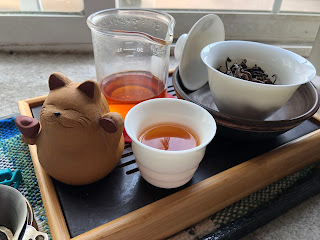Tea, Caffeine, Genetics, and Cultural Influences
In various tea forums, I see questions about caffeine in tea, caffeine consumption, etc. Some people seem to drink a lot and not be affected; some people are very sensitive to the tiniest amount of caffeine. Everyone is different and one person's tea consumption is going to be different from everyone elses. Is it a matter of genetics or culture? Turns out...a bit of both!
I had a DNA test done via one of the many companies out there like Ancestry, 23andMe, etc, etc., etc. According to their report, there are two genetic markers that help determine how much caffeine you can consume. It was so very interesting!
I've taken screenshots of that report and added the text so you can do your own research on the subject.
The first part deals with genetic markers that deal with caffeine absorption.
 |
| Screenshot: Genetic Markers |
In this section, the report also discuss current modern guidelines on caffeine consumption as well as other factors, like culture.
 |
| Screenshot: Other Influencing Factors |
Text from image:
----
"Other factors that affect caffeine consumption The genetic variants in this report are associated with a difference of up to about two thirds of a cup of coffee per day. But there are other factors that also affect how much and what types of caffeine people choose to drink:- Other genetic factors: Scientists are still discovering genetic variants that may help account for differences in caffeine consumption.
- Culture and history: Caffeine has been consumed for thousands of years in the form of coffee, tea, chocolate, and mate. Coffee originally became popular in Africa and the Middle East, tea in China, and chocolate drinks and mate in Central and South America. "
Apparently, I have two variants specific genetic variants for CYP1A2 (breaks down caffeine) and the AHR gene (controls the production of CYP1A2). In essence...
"You have two variants associated with consuming more caffeine."
Anecdotally, I already knew this about my tea consumption. I'm not particularly sensitive to caffeine in tea, and I can pretty much drink tea until all hours of the night without affecting my sleep patterns.
In addition, culturally, I grew up drinking tea, so both of these factors combined help dictate my tea intake.
It's nice to have a genetic report on the subject!
Everyone's tea consumption is going to be different. It's going to be based on your personal genetics and your health. You should always consult with your doctor on the subject and make the decision for your own tea intake for yourself.
As for me, I'm going to drink more tea....


Comments
Post a Comment